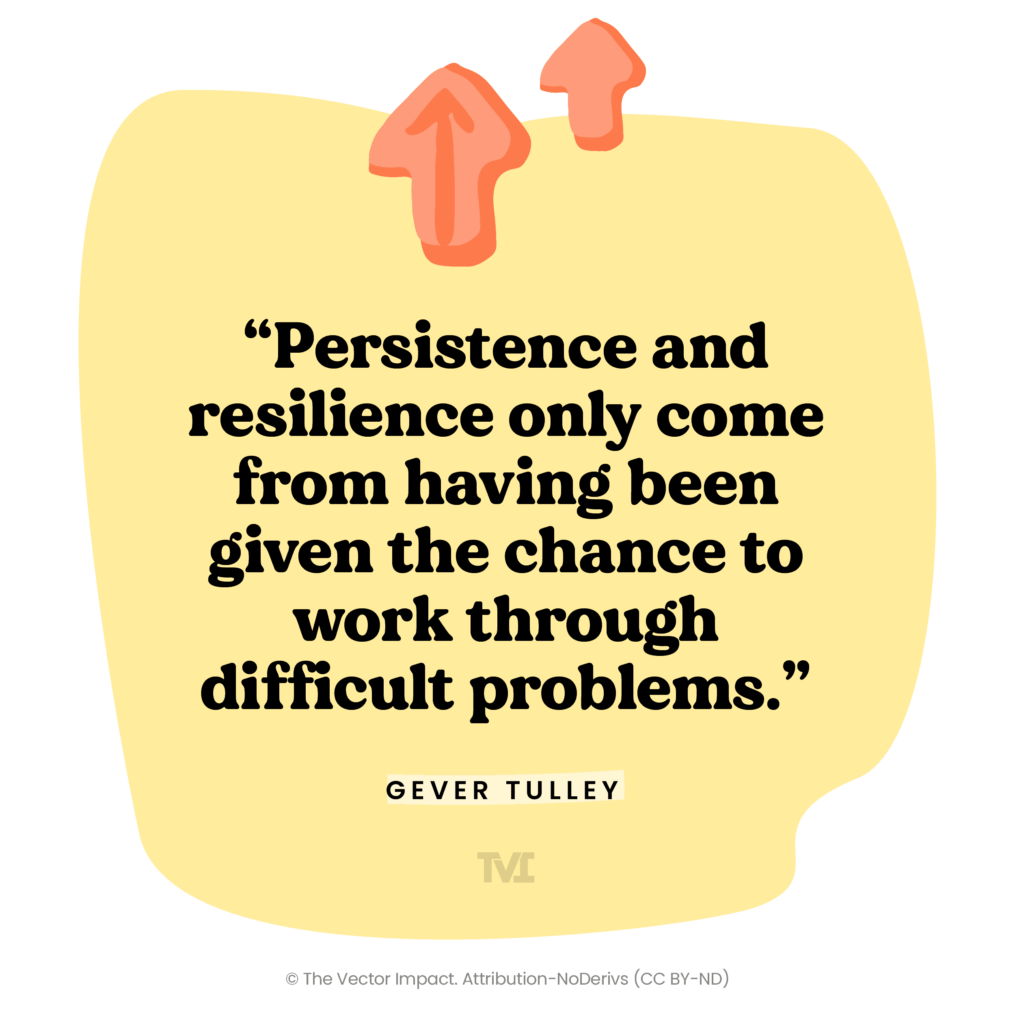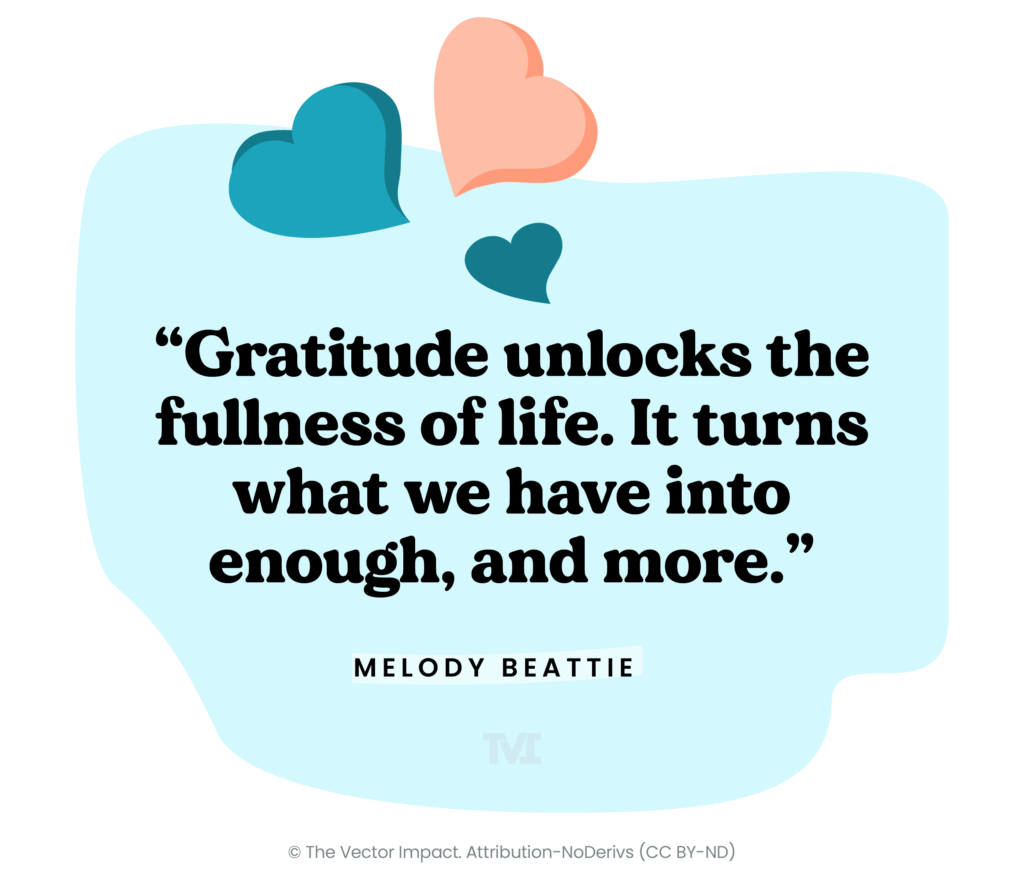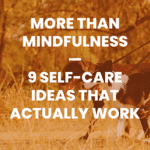Table of Contents
Have you ever met someone who effortlessly knows how to be more positive?
Those people who always seem happy, or at least content. They have an uncanny ability to find the silver lining—or at the very least not dwell on what they can’t change—in the face of frustrating, depressing, or frightening things.
If you’ve met someone like that, you know it’s infectious. Truly positive people seem to radiate their outlook on life, causing others in their orbit to gain their own sunnier disposition.
These people may make it look easy, but for most people, positivity doesn’t come naturally.
Not with stress from work…
Anxiety about our relationships…
Struggles with friendships…
Quarter-life crises…
Not to mention global climate change, economic and international crises, the growing wage gap…
I could go on, but I’ll stop there.
As you can see, I’m not always the most positive person. I know how easy it is to get caught up in all of that scary, challenging stuff. And I’ll spare you the details, but I can assure you I’ve seen my fair share of tragedy, pain, and trauma.
But most days, if you met me, you’d probably think I’m one of those positive people I described in my introduction.
That’s because I’ve worked hard to become a more positive person. It hasn’t been easy, and there have been plenty of missteps along the way.
But there are absolutely methods and habits anyone can use to cultivate positivity. I’m going to walk you through some of the best strategies I’ve found.
Mental Health Resources
This article talks a lot about mental health and finding happiness. If you or someone you know is struggling with depression or other mental health matters, speak with a professional counselor who can help.
Check out these resources:
Dial 988 to reach the national suicide & crisis hotline
Mental Health FIRST AID
American Counseling Association
Healthline Resources
What does it really mean to be a more positive person?
A positive person is someone who maintains optimism, even if the face of strife or stress. They are the half-glass-full type of people, and are less prone to dwell on life’s challenges.
Unfortunately, there are some common misconceptions about what it means to live a positive life. Let me make this very clear: When I talk about being a positive person, I am not talking about…
- Being happy all the time. In fact, it’s pretty much impossible to be more positive if you aren’t feeling a range of emotions.
- Saying yes to everything. Positivity can bring good things into your life. But failing to set boundaries won’t bring anything but burnout. In fact, trying to be a people pleaser all the time is more likely to lead to resentment than positivity.
- Putting on a smile for other people. True positivity is about finding a way to bring happiness and perspective into your own life. It’s not about how others perceive you.
- Ignorant bliss. Positive people aren’t blind to the challenges of being human. Forget everything you know about the “stupid but happy” stereotype. That’s not what we’re talking about here.
Now that that’s cleared up, what exactly does it mean to be a positive person?
Positive people are resilient

Positive people don’t sweat the small stuff
When we have a negative outlook on life, it’s easy to get caught up in the small things—old grudges, anxieties about the future, or past mistakes. When you learn to be more positive, these things become easier to deal with or let go of.
Positive people enjoy better physical health
Maintaining a positive mindset can improve your physical health, because positive people experience less stress. There’s science to back this up. According to John Hopkins Medicine, positive people who had a family history of heart disease are far less likely to experience cardiovascular events themselves, compared to people who had a more negative outlook.
Positive people have deeper experiences and relationships
When you remove negativity from your life, it can feel like storm clouds evaporating. You are less bogged down by things that are out of your control, and able instead to focus on the experiences and relationships you value most.
Positive people are deliberately that way
It may be that some people are naturally more positive than others, due to either nature or nurture. But anyone who maintains positivity throughout their life is doing so intentionally—they have made a conscious choice to seek joy, express gratitude, and let go of things they can’t control. It does not happen by accident.
8 ways to be a more positive person
If you want to find a way to be more positive, you can start taking action now. I’ve listed out some of the things you should strive for to become more positive, but remember—these things take work!
Be patient and kind to yourself. Don’t give up if you find yourself having negative thoughts or struggling to see the positive side of a situation. With patience, time, and dedication, you can start becoming the positive person you want to be.
1. Turn your environment into a healthy, non-toxic place
Much of the work you’ll do to become a more positive person will be internal—but your external surroundings can definitely impact how easy it will be to cultivate positivity.
When I talk about your environment, I mean the people, places, and things you surround yourself with. To create a healthy space for your positivity to flourish, you’ll need to do some housekeeping in all three of these areas.
You may find it’s easiest to start by making a healthier environment in the spaces that are yours—whether that’s your apartment, your desk at work, or your bedroom in your parents’ home.
Take a look at these spaces and reflect for a moment on how they make you feel. Is the clutter on your desk stressing you out? Is there a big, empty wall in your room that could use some art? Even small changes like these can help you relax and feel more at peace—that’s the kind of thing that can help you create a foundation for positivity. It won’t happen overnight—but the more positive space you can create, the easier it will be to become a positive person.
Distancing yourself from toxic people can be a lot harder. Sometimes we care deeply for people who are causing negativity—or our relationship with them makes it impossible to cut them out of our lives altogether.

But people who consistently throw a wet blanket on your attempts to be positive are going to stand in your way. You’ll either need to address their behavior with them, or find a way to distance yourself from them as best you can.
2. Accept that bad things happen
You know that saying, “Bad things happen to good people?” Well, it’s true. There’s no getting around it—unfortunate things happen to all of us, and it’s almost impossible to predict when life will send us an unexpected challenge.
For some people, these challenges will start earlier in life, or be more frequent due to their personal circumstances. But it’s highly unlikely that you’ll live a full life without encountering some unlucky, bad stuff.
That’s not an easy fact to accept—it’s natural for our brains to want to make sense of things that are tragic and challenging. Often, this will lead to feelings of shame, blame, or resentment—emotions that are really good at creating negative thoughts.
If you are instead able to accept that bad things happen, often for no discernable reason at all, then it becomes much easier to cope with these difficult moments. Finding healthy ways to cope when the going gets tough is a big part of being a positive person.
3. Treat your mind and body well
There’s no way I could write an entire article about being a positive person and not mention things like getting enough sleep, moving your body, and putting delicious, healthy things into your system.
I am not here to tell you that you must give up drinking and go to bed at 9 p.m. sharp to be a positive person. Instead, I encourage you to check in frequently with your own physical and mental health, to see how you’re truly feeling in the moment.
Checking in with yourself like this is as simple as finding a few minutes throughout the day to run a quiet, internal inventory. I personally like to do it when I wake up and before I go to sleep, but it’s best to find your own rhythm.
As you check-in, ask yourself questions such as:
- How awake am I feeling?
- Do I have any aches or pains?
- How is my heart rate right now?
- What emotions am I feeling today?
- What thoughts are weighing on my mind?
Listen to your own answers—the more you do this, the more you’ll be able to figure out if you need more sleep, or a glass of water, a phone call with a good friend, or a bit of yoga to warm you up.
Don’t take it from me. Studies have shown that a lack of sleep can cause people to lose their positive outlook. And it’s well documented that moving your body helps your brain produce serotonin—the chemical that makes life seem sunnier.
4. Find ways to practice gratitude

How often do you pause and think about the good things going on in your life?
It’s so easy for us to dwell on the negative—our brains seem to want to think about stresses and anxieties, to eternally ask “what if” or say “not good enough.”
But it’s not so easy for us to spend time thinking about all the good things we have going on—even if those good things seem very small compared to the negative stuff in our lives.
Look, I know how annoying it can be when people try to force you to see the sunny side of a crappy situation. Sometimes, when life is really not going your way, it’s wise to acknowledge how awful things are and allow yourself to voice your sadness or frustration.
But to become a more positive person, you must balance out these moments of sadness with reflections of gratitude.
What do I mean by gratitude?
It simply means acknowledging and being thankful for positive things.
Sometimes this can be done completely silently and internally—a game I often play at stoplights when I’m driving is to list off some things I’m really thankful for until the light turns green.
Laughing, smiling, and allowing yourself to relax also can count as forms of expressing gratitude—but try to bring some awareness to these happy moments, so that you can hold onto them longer and recall them when you need them.
You can also keep a gratitude journal, where you write down once or twice a day something positive that happened or something you’re thankful for.
And I highly recommend this—tell the people around you what you are grateful for! Tell your dad how thankful you are for the delicious meal he cooked, or let your best friend know how much fun you have with them.
Positivity is infectious. Share it with others, and acknowledge it within yourself, and it will continue to grow and spread.
5. Strive to experience a wide range of emotions
Earlier in this piece, I mentioned it isn’t possible to become a more positive person if you aren’t able to experience a full range of emotions.
This includes emotions that are often seen as total opposites to positivity: sadness, anger, confusion, disgust, frustration, grief—all of these emotions serve a purpose, and without them, true positivity will remain out of reach.
Sadness and grief allow you to process challenging things, so you can let them go or adapt to them faster.
Anger and disgust can protect you when you’re in danger, and frustration and confusion are necessary to solve problems.
These emotions also work together, and are not always easy to separate from one another.
For example, most of my memories of my late mother are both incredibly joyful, and because she’s no longer here, bring me plenty of sadness. If I refused to feel that sadness, then the joyful memories would also be out of reach. And robbing yourself of joy is a surefire way to sabotage your mission to become a more positive person.
Learning how to manage your emotions (instead of bottling them up or ignoring them) will give you a huge advantage in life. But it’s not easy, and it takes practice. And how can you practice if you refuse to let yourself really feel these emotions?
If you really want to get a good (and entertaining) depiction of what I’m talking about, I highly recommend Pixar’s masterpiece about emotions, Inside Out.
6. Allow yourself to be playful and weird
Have you ever noticed how much kids smile and laugh when they are playing games with each other? That’s because play is something that is innately positive—and sadly, it’s something we stop talking about after childhood.
As you grow into adulthood, you’ll find there are plenty of heavy things to worry about. As you gain more responsibilities, your “play time” will be eaten up by super-serious grownup stuff, like work, paying rent, or going on awkward first dates.
To help you keep that positive spark alive into adulthood, you need to make time for yourself to be playful, silly, weird, and uniquely you.
Playtime will look different for everyone. For me, it often means cocktails and food with friends who make me laugh, or simply a long and relaxing swim in the lake near my house—and maybe the occasional dance party in my underwear when no one is watching.
Remember that playfulness and creativity are closely linked. Painting, singing, dancing, writing, dressing up in a unique outfit—all of these things are excellent ways of playing and finding a creative outlet.
Allowing your creativity to flow, for no other reason than simply because you enjoy it, will allow you to feel more positive in the face of those dreary moments that make up a lot of adult life.
7. Learn how to be more positive at work, get positive results
It’s not uncommon to feel like your “work life” and “personal life” are two separate things. It’s also completely possible to be a positive person when you’re not in the office, while at work you are plagued with negative thoughts and feelings.
It can feel impossible to bring positivity if you’re working with a toxic boss, or if you are preoccupied with the idea that it may be time to quit your job. But I have written a few resources that can definitely make it easier to ease the resentment and frustration:
8. Let go of blame and resentment
I’m leaving the hardest one for last—but there’s no way around it. If you want to become a more positive person, then you have to actively work toward letting go, forgiving, and moving on from the past.
This takes work! Especially when we feel we have been done wrong by someone or something in the past. It gets even worse if we feel like things were unresolved—justice was never served and wounds were never healed.
Holding on to these things after they are over, though, will make it impossible for positivity to grow.
I wish I could tell you how to let go of things that linger from your past, but there’s simply not enough of a word count to do it. But one method is practicing mindfulness, something I wrote about in these articles:
As I’ve mentioned earlier in this article, mental health counseling and support can be very useful when working through issues from your past. I’ve found talking things out with a professional counselor has helped me accept things that were out of my control, thus making space for positivity to grow.
Those are some of my best tips for finding a way to a more positive life. You should feel proud that you’re looking for ways to reduce negativity and find a happier way to live—if you put in the work, it will be sunnier skies for your future.



















